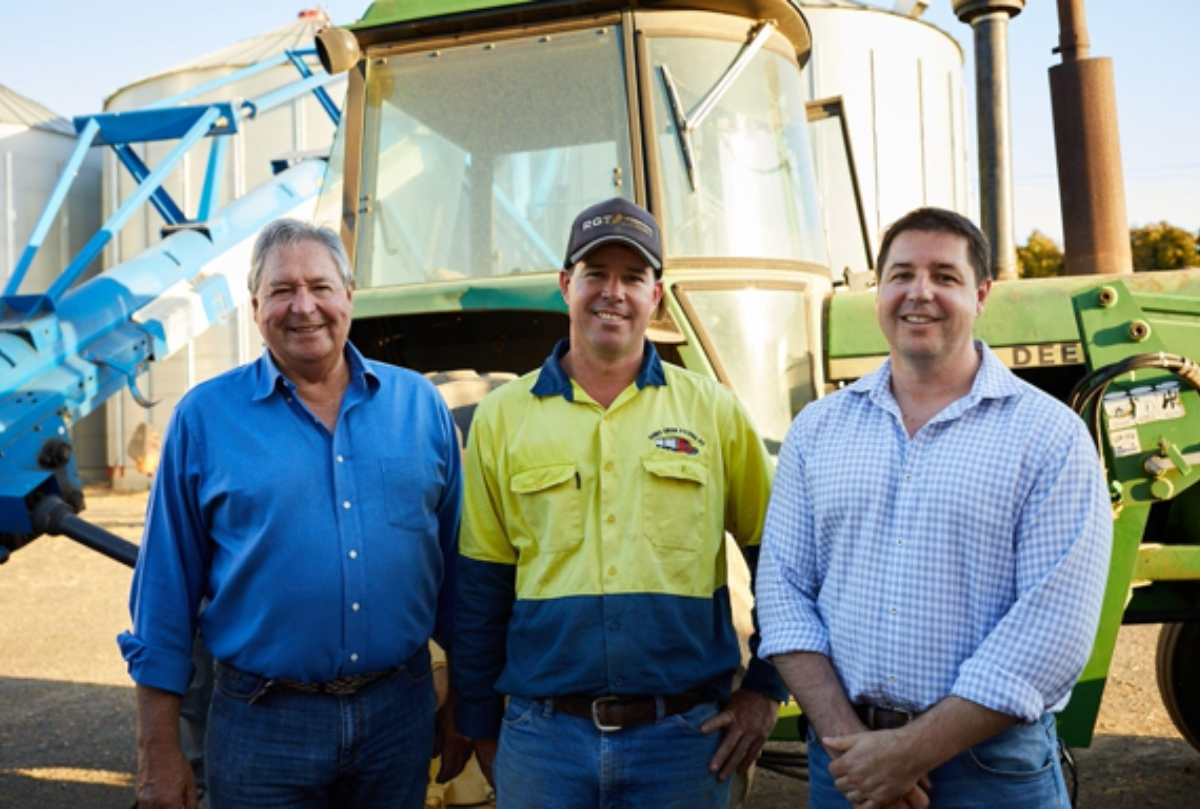May 25, 2022
Adam Robinson, the general manager of Robinson Grain Trading's Sydney division, talked to Madaline Dunn about his ties to the industry, finding solutions to setbacks, and his positive outlook on the future of Australian pulses.


In 2008, I started in the family business. Around that time, there were only a few trading houses trading pulses in Australia and a lot of farmers we were dealing with who were growing wheat, barley, canola, etc., were asking us for other options. That's when we started trading in chickpeas, fava beans and lupin beans for Egypt. From there, we began to look into those commodities, researched where the demand was, and looked for customers in those parts of the world. We traveled, spent some time overseas, went to lots of trade events and developed our markets. We just organically grew the business from there.
Now, we deal with pulses, grains and oilseeds. On the pulses side, we predominantly trade chickpeas, fava beans, lupins, and field peas. Our supply chain is from farm gate to consumer, so we try to buy directly from growers in our key areas and export directly to consumers globally.
The chickpea market has been difficult for the last four months, mainly due to logistical issues out of Australia. Right now, getting container space into our key markets is really challenging and it's impacted the amount of volume that we can buy off the farmer and trade. There has been demand but we just haven't been able to match that up with logistics. A prime example of this is Pakistan - we usually send a large volume of chickpeas to Pakistan but between September to February this year we couldn't even get five containers on a vessel to go to Pakistan. Bangladesh is another key market for us - although we managed to get some freight into that market, a larger amount of bulk shipments have been going out from Australia, which is simply due to the logistical constraints around containers.
There are definite constraints at port for bulk as well, with most of the winter grain: wheat, barley and canola taking up the space at port, rather than chickpeas and other pulses. On the back of that, quite a few farmers planting in April, May, and June may change their plans around planting pulses.
We've had to change the way we trade. We can only sell to the amount of freight we're supplied with, and even then, shipping lines can cancel those bookings prior to shipment. So, it's really reduced our trading volume. Going forward, we know that it will change, but it's hard to say when.
Right now, there's a lot of uncertainty, and it's difficult to predict what’s going to happen in the next 6-12 months. It's also affected our time frames. Typically we'd sell four to five months in advance if demand is there but now we're only one or two months in advance in making sale and that's just because we don't know what the freight is going to be like or how many containers we're going to get; we can only sell what's in front of us.
The fava bean market has been more severely impacted than the chickpea market. Although we've managed to get some chickpeas over to Bangladesh and Pakistan, the vessel space for fava going into Egypt has been fully booked with higher-paying general freight. So, that's really impacting the volumes we can export, especially from New South Wales.
In South Australia and Victoria, we've seen a lot more bulk shipments go out and while for South Australia that's always tended to be the case, this year there's definitely been more because there just aren't the containers to go to those markets. Our local farmers in our New South Wales hub have been really impacted because they haven't had access to that bulk shipment trade. Some of those growers have even been driving a 600-1000km round trip just to get their fava beans to a market whereas normally nearly all of their grain would have gone through local supply chains into containers and off to Egypt.
The one interesting thing about this situation is that the domestic markets in New South Wales and Queensland are using more fava beans this year and they're mainly going into the feed market as a substitute for soybean meal. So, we're seeing a little more demand there but, from a production standpoint, they're not getting as much money for their product because the fava beans are not going to a premium market. It's definitely impacted grower mentality around what they should be growing and this may limit their willingness to plant the same volume next year.
Yes, I'm sure there has been that impact, but we're not seeing it on our end directly. Australia is exporting large volumes in bulk, especially from South Australia, but even if we could see the demand coming in, the logistical issues mean that we couldn't satisfy it.
From an Australian point of view, any storage guidelines are great, and give growers a good idea of how they should be doing things but, from a general perspective, Australian storage is already very good - we've been implementing the same practices for many years. We can store our products for a long time and typically don't have to deal with loss and deterioration. It's in both ours and the farmers' interest to store crops for as long as possible because that gives farmers more choice in the markets and allows them to hit premier markets even later on in time.
I think growers will continue to invest in their storage capacity going forward and I think that's a good thing.
We're seeing the impact on the farm side but it's definitely having an impact across the whole supply chain, too. It's a real issue - there's a lack of truck drivers moving commodities around locally and sowing and harvest periods are taking longer, which could result in some reducing their acres but, so far, we've not seen that.
The whole industry is battling the situation and, while I don't think it's affecting the volume of what we grow, it's impacting how we move it.
Although these are issues that farmers have been dealing with since time began: too much rain, not enough rain, too much rain at the wrong time - the last 12 months have definitely been frustrating.
We had a record crop on the east coast with winter crops combined and to see that potential diminished through downgrading and weather has been difficult; there's not really much growers can do about it. It's definitely had a financial impact across the entire supply chain.
Australia as a whole is a large net exporter of pulses. Year on year, we're a dominant exporter and that's largely because we have very little local demand. I think this roadmap could lead to more investment in local manufacturing and plant protein development in Australia, which can only be good for the country. With that kind of promotion, we'll only see pulses continue to grow in Australia.
Right now, what we're missing is really strong local demand. We rely so heavily on exports and with logistical challenges this year, that lack of executable demand has been frustrating so focusing on local demand will give us a really good base to build on for our exports and production. It will also get us away from tariff issues that have really affected Australian farmers' ability to export. So, the more we can do domestically, the better.
There are a lot of other products that are getting a very good run with that agreement. Lentil tariffs are quite reduced already and I know there's potentially a chance to reduce the tariffs on other pulses over time but the key one is still chickpea tariffs - they haven't changed at all.
Bangladesh, Pakistan and India are the three main markets for chickpeas and, without one of those key markets, it's difficult for Australia, which grows a lot of chickpeas because we don't have a market to sell them into. It's an impediment to trade.
Pulses are now very much ingrained in the Australian farm rotation but it was only ten to 15 years ago that pulses were not as favorable. That said, there's been a lot of advancement in plant breeding, which has created different varieties to suit different regions and limited disease - these factors pushed the pulse industry to get where it is today.
I think the future is bright for pulses, even if it's just for agronomic reasons and farmer rotation. If we can get these investments, especially into local pulse protein facilities, it's only going to be beneficial for the Australian farmer and promote pulses even more.

Gary Robinson, Director (Left), Trent Robinson, Site Manager - Dubbo (Middle), Adam Robinson, General Manager - Sydney (Right)

Adam Robinson / Robinson Grain Trading / Australia / chickpeas / fava beans / lupin beans / peas
Disclaimer: The opinions or views expressed in this publication are those of the authors or quoted persons. They do not purport to reflect the opinions or views of the Global Pulse Confederation or its members.